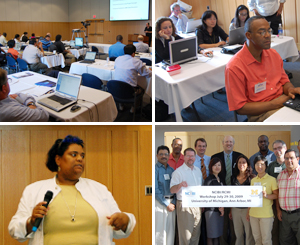- Search NCIBI Data
(e.g. diabetes, csf1r) - Login

2009 NCIBI / RCMI - Workshop on Translational Bioinformatics
 About the Workshop
About the Workshop
The purpose of the workshop was to provide RCMI investigators training in the use of NCIBI tools and resources for translational research, and to build research relationships with the goal of expanding informatics resources for the study of health disparities. The workshop agenda consisted of an overview of NCIBI and NCIBI tools as well as introductory hands-on tutorials with NCIBI tools. Participants also learned about programs designed to foster collaborations at UM and had the opportunity to network with UM researchers as well as other RCMI investigators. An NCIBI investigator presented a keynote talk entitled, "Systems Biology of Diabetic Nephropathy". The agenda, abstract booklet, photos and slides and videos from the presentations can be viewed by visiting the links on the right.
Workshop Presentations Videos
Adobe Flash Player is required for viewing these videos.
- Introductions and Research Focus of RCMI Participants
- NCIBI Overview - Brian Athey, Ph.D.
- NCIBI Pilot Project: co-morbidity of substance abuse with bipolar disorder among African American women - Raphael Iskopehi, Ph.D.
- Overview of NCIBI tools - James Cavalcoli, Ph.D. - PDF
- Proteome Informatics Resources - Phil Andrews, Ph.D.
- Literature Mining: behind the scenes: web-based access - Alex Ade - PDF
- Next-Generation Sequencing - James Cavalcoli, Ph.D. - PDF
The NCIBI Tutorials presented at the Workshop and corresponding files and documents can be found on the NCIBI Virtual Workshops page.
Workshop Participants
| Image | Name | Research |
|---|---|---|
 |
Ney Alliey-Rodriguez University of Chicago |
Dr. Alliey-Rodriguez's research is focused on genetics of mental disorders and behavioral traits taking active part of psychiatric diseases. He is performing association studies (GWAS) for personality traits in Bipolar Patients. |
 |
Leonard Anderson Morehouse School of Medicine |
Dr. Andersonís research laboratory is focused on cardiovascular genomics. In particular, the modulation of the cellular transcriptome during early vascular smooth muscle cell (VSMC) fate determination from pluripotent stem cells in cell-based and murine models of differentiation and development. |
 |
Jaideep Chaudhary Clarke Atlanta University |
Dr. Chaudhary's research focus is to understand molecular basis of prostate cancer development and progression. His lab currently has two projects in this area. The first project is focused on understanding the role of bHLH family of transcription factors in prostate cancer initiation and progression. The second, relatively new project addresses how inflammation and infection causes prostate cancer. |
Meharry Medical College |
||
Ahmed Fadiel Meharry Medical College |
Translational research requires the development of novel tools that will enhance our knowledge, improve research performance and accelerate the discovery process. Our aim is to develop informatics concepts/tools that support Clinical and Translational Methodologies. As a member of the RTRN, MMC took the lead in developing the new approach to translational research informatics named MATRIX aimed at facilitating and enhancing translational research in minority centers. |
|
 |
Wifredo Hernandez Ponce School of Medicine |
Preventive medicine is the rational response to the rising medical costs. This response includes a renewed emphasis on antioxidant foods and supplements to lower risk from cancer, which is now the number one fatal disease. The major aim of Dr. Hernandez's research is to evaluate suppression of mutagenesis by sulfhydryl antioxidant N-acetylcysteine (NAC), and alpha-lipoic acid, both of which potentiate glutathione activity, the gold standard of antioxidants.†This work will test the notion that antioxidants can effectively block mutations caused by oxidative damage. In addition, our results will provide a basis for a rational policy on the use of antioxidant supplements in humans, either as an anticancer strategy or for counteracting age-related diseases. |
 |
Raphael Isokpehi Jackson State University |
The theme that ties my bioinformatics research interests is the integrative analysis of biological datasets with the goal of uncovering novel biological insights from observed patterns. The thematic emphasis permits my participation in a variety of projects that require the development and use of data integration pipelines. |
 |
Juliana Perez Laspiur University of Puerto Rico |
Dr. Laspiur's research is focused on understanding the neuroprotective mechanism of estrogen and fluoxetine may lead to improvements in current therapeutic strategies as well as new diagnostic tools for Human Immunodeficiency Virus (HIV)-associated Neurocognitive Disorders (HAND) targeting the mission of the National Institute of Neurological Disorders and Stroke (NINDS) and the National Center on Minority Health and Health Disparities (NCMHD) which seek to reduce neurological disorders and health disparities by increasing our understanding on the mechanisms of diseases such as HAND. |
Chunmei Liu Howard University |
Dr. Chunmei Liuís research interests include Algorithms, Computational Biology, Graph Theory, and Theory of Computation. Her previous research developed a graph tree decomposition model and used it to solve a number of bioinformatics problems |
|
 |
Chun-yu Liu University of Chicago |
Dr. Liu's major research interests are in the areas of genetics, genomics, and epigenomics of neuropsychiatric diseases, particularly Bipolar Disorder and Schizophrenia. Four major ongoing projects are: 1) microRNA in bipolar disorder and schizophrenia: looking for variants in miRNAs that might be related to the diseases; 2) gene expression regulation in human brain: map gene expression controllers in brain; 3) CNVs and SNPs in whole genome association study of bipolar disorder: looking for SNP/CNV association with the disease; 4) G72 transgenic mice: study biochemical, genomic, and behavioral changes in a human BAC transgenic mice that may serve as a model for human psychiatric diseases. |
 |
Angel Mayor Unversidad Central del Caribe |
Dr. Mayor has been involved in the study of acute and chronic conditions related to the HIV-infection in the Puerto Rican population. He had study the prevalence of AIDS related condition, neoplasm, diabetes mellitus, renal damage and liver damage in Puerto Rican HIV infected persons. In addition he evaluates the mortality rates and mortality causes of this population. |
 |
Guylaine Poisson Assistant Professor University of Hawaii |
The focus of Dr. Poisson's current research is on the development of algorithms and tools for large-scale dataset analysis, including protein pattern prediction, |
 |
John V. K. Pulliam Morehouse Sch of Med |
Dr. Pulliam studies the transcriptional regulation of gene expression following stroke and NRG-1 treatment using microarray technology and bioinformatic tools to determine putative transcriptional regulators by computational analysis. Transcription factors identified in theses studies may be potential novel targets for the treatment of acute stroke. |
Jeremy Ross University of Texas at El Paso |
The goal of Dr. Ross' research is to isolate, bank and test Hispanic derived leukemia and lymphoma samples and use innovative multiplexing technologies to identify intracellular and extracellular proteins that will yield insight for early detection and treatment possibilities for these malignancies. He will also
use and develop novel antibodies and tools coupled with mass spectrometry analysis to identify and expand |
|
 |
Gregory Strayhorn Morehouse Sch of Med |
Dr. Strayhorn's current work and funding center on developing a clinical research data repository that will be used for clinical, translational, and health services research. He is currently working a project that looks at whether access to health care researches are sufficient for disease management relative to income/financial resources external to the health care setting. |
 |
Zhiwei Wang University of Texas San Antonio |
The overall objective of the Computational Biology Initiative (CBI) is to provide a world-class facility supporting the research of current as well as future biologists at UTSA as well as the training of students. The CBI, constructed with funding from the RCMI, supports a range of research from sophisticated studies of genomes, to analysis of the dynamics of the regulation, control and expression of proteins, to increasingly complex efforts to construct models at all levels of biological organization. † |
 |
Huan Xie Texas Southern University |
Dr. Xie's research interests are on nanoparticle-based drug formulation, drug delivery system, cancer therapy and diagnostics. Her current research at TSU is focused on developing an integrated approach using gold nanorods as a scaffold and arginine-glycine-aspartic acid (RGD) peptide as intergin avŖ3 binding moiety for tumor neovascular targeting. |

 NCIBI on Facebook
NCIBI on Facebook NCIBI RSS Feed
NCIBI RSS Feed

